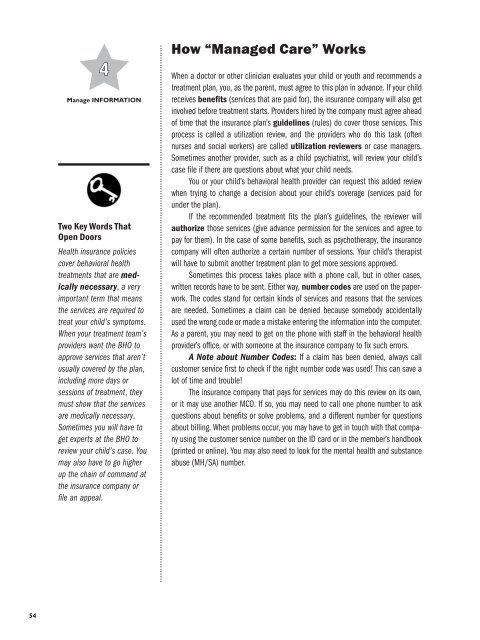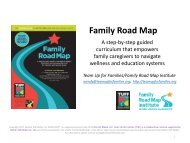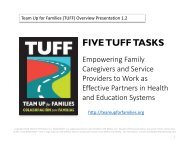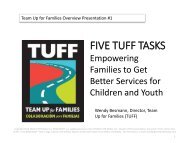Family Road Map Guide
You also want an ePaper? Increase the reach of your titles
YUMPU automatically turns print PDFs into web optimized ePapers that Google loves.
4<br />
Manage INFORMATION<br />
Two Key Words That<br />
Open Doors<br />
Health insurance policies<br />
cover behavioral health<br />
treatments that are medically<br />
necessary, a very<br />
important term that means<br />
the services are required to<br />
treat your child’s symptoms.<br />
When your treatment team’s<br />
providers want the BHO to<br />
approve services that aren’t<br />
usually covered by the plan,<br />
including more days or<br />
sessions of treatment, they<br />
must show that the services<br />
are medically necessary.<br />
Sometimes you will have to<br />
get experts at the BHO to<br />
review your child’s case. You<br />
may also have to go higher<br />
up the chain of command at<br />
the insurance company or<br />
file an appeal.<br />
How “Managed Care” Works<br />
When a doctor or other clinician evaluates your child or youth and recommends a<br />
treatment plan, you, as the parent, must agree to this plan in advance. If your child<br />
receives benefits (services that are paid for), the insurance company will also get<br />
involved before treatment starts. Providers hired by the company must agree ahead<br />
of time that the insurance plan’s guidelines (rules) do cover those services. This<br />
process is called a utilization review, and the providers who do this task (often<br />
nurses and social workers) are called utilization reviewers or case managers.<br />
Sometimes another provider, such as a child psychiatrist, will review your child’s<br />
case file if there are questions about what your child needs.<br />
You or your child’s behavioral health provider can request this added review<br />
when trying to change a decision about your child’s coverage (services paid for<br />
under the plan).<br />
If the recommended treatment fits the plan’s guidelines, the reviewer will<br />
authorize those services (give advance permission for the services and agree to<br />
pay for them). In the case of some benefits, such as psychotherapy, the insurance<br />
company will often authorize a certain number of sessions. Your child’s therapist<br />
will have to submit another treatment plan to get more sessions approved.<br />
Sometimes this process takes place with a phone call, but in other cases,<br />
written records have to be sent. Either way, number codes are used on the paperwork.<br />
The codes stand for certain kinds of services and reasons that the services<br />
are needed. Sometimes a claim can be denied because somebody accidentally<br />
used the wrong code or made a mistake entering the information into the computer.<br />
As a parent, you may need to get on the phone with staff in the behavioral health<br />
provider’s office, or with someone at the insurance company to fix such errors.<br />
A Note about Number Codes: If a claim has been denied, always call<br />
customer service first to check if the right number code was used! This can save a<br />
lot of time and trouble!<br />
The insurance company that pays for services may do this review on its own,<br />
or it may use another MCO. If so, you may need to call one phone number to ask<br />
questions about benefits or solve problems, and a different number for questions<br />
about billing. When problems occur, you may have to get in touch with that company<br />
using the customer service number on the ID card or in the member’s handbook<br />
(printed or online). You may also need to look for the mental health and substance<br />
abuse (MH/SA) number.<br />
54














